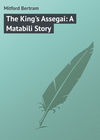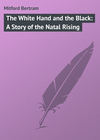Buch lesen: «Harley Greenoak's Charge», Seite 9
Chapter Seventeen.
The Express-Riders
Corporal Sandgate and Trooper Stokes rode forth from the Police camp on express duty.
They were entrusted with very important despatches indeed; to the effect that, owing to the accidental explosion of an ammunition waggon, the large force of Frontier Armed and Mounted Police in camp at the Kangala might, at any moment, find itself alarmingly short of that essential article; and containing urgent injunctions to the authorities in charge of the border post – where an ample supply was stored – to send on a sufficiency of the same, under escort, without a moment’s delay.
The two men had been specially selected for this duty. Sandgate was a young Englishman of good family, who, like many a superfluous or younger son at that time, had emigrated as a recruit for the frontier corps, beginning at the bottom. He was a fine, sportsmanlike, athletic fellow, who could ride anything and anywhere, and had soon got his first hoist on the steps of the ladder of promotion. The other man, Stokes, was a wiry, hard-bitten Colonial, no longer quite young, who had been some years in the Police, but had twice lost his step as corporal owing to an inconvenient hankering after the bottle. When away from its temptations, as in the present case, he was one of the most useful men in the Force. Each, we have said, had been specially picked for this duty; Sandgate for his pluck and dash, and a reputation for readiness of resource which he had managed to set up, Stokes for his knowledge of veldt-craft.
The two express-riders started from the Kangala Camp at moon-rise, which took place early in the evening. It was calculated that, by riding all night, they should reach their objective, Fort Isiwa, not much later than the following midday. They could, by no means, cover the distance in anything like a straight line, nor was there, in many places, anything that could be called a track, which was where Stokes’s veldt-craft was to come in: even then their route skirted the turbulent Gudhluka Reserve, whose swarming inhabitants were just then in a particularly dangerous state of simmering unrest, and would as likely as not make short work of a couple of members of a body whom they loved not at all, given an opportunity. Once beyond this danger belt, however, there would be little or no risk, for, after that, the country was sparsely populated, and its inhabitants less disaffected. So the programme before these two was to push on for all they knew how, so as to get over the more risky portion of their ride under cover of night.
This being the case, it might have seemed a little strange that, having arrived at a point about five miles from camp, where the far from distinct waggon track forked into two, they should have reined in their horses, and sat listening.
“Tell you what, Sandgate,” muttered Stokes, cramming a quid of tobacco into his mouth – under the circumstances, for obvious reasons, the pipe must be foregone with stern self-denial. “Tell you what. It’s no good our waiting. He won’t come. He’s thought better of it. Greenoak’s likely turned up again and stopped it.”
Both men sat for a couple of minutes longer, their feet kicked loose from their stirrups. Then, as they were on the point of resuming their way, a sound caught their ears – the tread of a horse, on the way they had just come over.
“Hallo, you fellows! About given me up, I suppose?” said Dick Selmes in a low, excited tone, as he rode up.
“We were just going to,” answered Stokes, who was inclined to be short of speech and a bit sour towards so obvious a specimen of the gilded youth as this one. “And, I say, if you could keep that confounded brute of yours from jingling that swagger bit so as to be heard all over the Gudhluka Reserve, why, it’d be just as well.”
“He’ll be all right directly, soon as he’s let off a little more steam,” said Sandgate, good-humouredly, with a glance of approval at Dick’s spirited and well-groomed mount, which, in sheer enjoyment of the fresh freedom of the veldt, was tossing his head and blowing off clouds of vapour upon the cool night air.
That Dick Selmes had been able to join the two express-riders had involved some plotting; for, from the moment he had heard of their errand, incidentally through Inspector Chambers, to whose troop they belonged, he had firmly made up his mind that join them he would. But, on putting this to the Inspector, that worthy had promptly vetoed the whole business – subsequently compromising, however, by suggesting that the matter be submitted to the Commandant.
The latter, however, a fine old frontiersman born and bred, took a different view. He was a reserved, undemonstrative man, but had taken a liking to this dare-devil youngster by reason of his pluck and adaptability.
“I don’t really see why he shouldn’t go if he’s keen on it, Chambers,” he said. “The experience will do the young dog no harm, and he seems able to take care of himself. Greenoak keeps him too much in leading-strings. Oh, that,” as the Inspector, with a dry laugh, recalled a certain adventure in Vunisa’s location which would have cost our friend his life but for the shrewdness and promptitude of Harley Greenoak. “Well, yes. But, on the whole, Sandgate and Stokes are thoroughly reliable men, and will keep him in order. Of course, I need know nothing about it officially, nor need you; but if he should find his chance of slipping away after them, why, after all, he’s only our guest here, and can come and go as he chooses,” concluded the Commandant, with a twinkle in his eyes.
Harley Greenoak was away upon a critical and delicate mission which he had undertaken as a personal favour to the Commandant. As things were at present, he argued, his charge could come to no harm, at any rate for a day or two, by which time he himself would be back. All of which accounted for the comparative facility wherewith Dick had slipped away – a facility which struck our two express-riders as strange.
Something of a friendship had grown up between Dick Selmes and Corporal Sandgate. They were of the same age, had the same tastes, and, hailing from adjacent neighbourhoods in the Old Country, had acquaintance in common. On such they chatted in subdued tones, as they held on their way rapidly through the calm beauty of the African night. So far the said way was easy, as under the unerring guidance of Trooper Stokes they crossed each rolling upland, mimosa-dotted and grassy. Here and there, far-away, the mysterious dimness was relieved by the red glow of a grass fire, or might it be the weird signal of plotting savages? Soon, however, the ground became more rugged. They forded a small river, rippling deep down in a thickly bushed valley, and the steeds drank gratefully of its cool, if slightly brackish, water. Then on again.
“We must swing back again here,” said Stokes, as they drew rein on top of a ridge to loosen the girths and give the horses a quarter of an hour’s rest and feed. “There are kraals in front of us. I can smell ’em.”
“The deuce you can?” said Dick, vividly interested. “I can’t. You’re not getting at us, old chap, are you?”
To this Stokes vouchsafed no reply. He stroked his thick, wiry beard, looking unutterable contempt.
They resumed their way, sometimes making a considerable détour to avoid suspicious neighbourhood. Once the barking of dogs, alarmingly near, caused a thrill of anxious excitement. Had the tramp of their horse-hoofs been heard? they wondered, as they swerved off as noiselessly as possible. At last, what looked like a building loomed in front of them. Just behind it were three or four native huts.
“I thought so,” exclaimed Stokes. “Blamed if this isn’t old Shelbury’s store. We’ve come a leetle more out of our road than we need have done, Sandgate.”
“We’ll make it up. I say, hadn’t we better off-saddle and have some grub?” suggested Dick Selmes, cheerfully.
Stokes looked at him sourly.
“Grub!” he echoed. “You’ll get none o’ that here. Any fool could see that Shelbury’s cleared. Why, the place is all stove in and the whole show looted.”
Closer investigation proved such to be the case. The door hung on one hinge, and seemed very much battered.
“We’ll push on,” said Sandgate, with an anxious glance at the moon, now getting low. “The further we do that under cover of night the better.”
But Stokes, rapping out something about just taking half a squint inside, and catching them up again in a jiffy, was already off his horse. The other two, resuming their conversation about old times and scenes at home, held on the way he had pointed out to them. So taken up were they that it was quite a little while before it occurred to them that it might be advisable to pull up and wait for Stokes. Nor had they long to wait.
“Just as I thought,” he said, coming up. “The whole shoot has been cleared from top to bottom. You never saw such a mess in your life. But there’s no one dead inside.”
As they rode on, neither Sandgate nor Dick noticed that Stokes kept rather behind. The moon, too, had almost sunk, wherefore, perhaps, they further failed to notice that his tan-cord uniform jacket bulged.
Chapter Eighteen.
The Ordeal
It was just the dark hour before dawn when Sandgate called a halt.
“We might safely do half an hour’s snooze here,” he said. “The gees want that amount of rest. You turn in, Selmes, and I’ll do horse-guard. No – no – don’t wrangle, man; each minute of that means so much less hard-earned snooze; besides, I’m in command here. Stokes, you look done too. Well, off you go, both of you.”
The latter, with a cavernous yawn, was off like a log. Dick, with a sleepy laugh, followed suit. Then Sandgate, loosening the girths, but not off-saddling, allowed the horses to graze, their bridles trailing on the ground, and set to work to watch.
The place in which they had halted was among some broken rocks, a small hollow, in feet, and admirably adapted for a hiding-place. The back was overhung by boulders, and in front, beyond a lip of the same, the ground fell away in a rugged slope to the bottom of a deep bushy kloof. To Sandgate, left to his lonely vigil, that brief half-hour seemed long enough. To the other two, heavy in slumber, it was as a flash.
“Now then, Selmes. Time,” he whispered, with a hand on the other’s shoulder. In a trice Dick was up, but yawning pathetically. He shivered too, for a thin damp mist was stealing athwart the rocks and bush sprays.
“All serene,” he said, ready and alert. “Kick up the other fellow.”
But although this was done, and that literally, for all the effect it produced Stokes might as well have been dead, or a bit of timber. And then, as an acrid fume rose poisonous upon the cold morning air, Sandgate stood aghast with wrath and horror. His colleague and subordinate was drunk – dead drunk.
Yet how? In a moment something of the truth flashed across his brain. That wretched trader’s store they had passed! Stokes must have found grog in there, which had been overlooked by the plunderers. His cursed instinct had moved him to go inside and explore. There was no sign of any bottle about Stokes, certainly, but this he would have been slim enough to drop unseen and unheard. Now the mystery of his lagging behind stood explained.
“Great Scott! And the despatches!” exclaimed Sandgate, horrified.
“Take ’em on, and leave him here to get sober,” suggested Dick. “He deserves it.”
But Sandgate objected to deserting a comrade in dangerous country. He himself would be reduced to the ranks, of course, kicked out of the Force most likely, but he could not abandon a comrade. To this Dick suggested that he should remain with Stokes while Sandgate rode on.
“That won’t do either, Selmes,” said the latter, gloomily. “You’re new to this country, and in my charge. No – that won’t do.”
“But think of the vital importance of the despatches,” urged Dick. “This fellow has brought it all upon himself. Besides, he’s supposed to know his way about better than both of us put together. So I say, let him take his chance.”
“We’ll have one more try,” said Sandgate.
They had, and it was an exhaustive one. They shook and hustled the stupefied man, and threw in his face what little water remained in their bottles. In vain. Stokes merely gave an inarticulate grunt, and subsided into deep slumber again. Then they tried another plan – that of placing him on his feet by main force. Still in vain. The drunken man slid to the ground again, and in their efforts to keep him up both Sandgate and Dick lost their balance, stumbled, and fell with him.
Before they could rise several pairs of muscular hands had gripped each of them, and bulky forms pressed them down. So effectually were they pinioned that they could not even reach their revolvers, which were promptly reft from them. The little hollow which was their resting-place was swarming with Kafirs, who had stolen upon them like snakes what time their attention was taken up endeavouring to restore consciousness to Stokes; even the warning which should have been conveyed by the alarmed snorting and restiveness of the horses had escaped them. They were absolutely in the power of these savages, who had surprised and captured them without giving them an opportunity of striking a blow in defence of their lives, and, to one of them, of his trust.
The first thing their captors did was to bind them securely with the reims cut from their horses’ headstalls. Then a hurried consultation began among them. A man who seemed in authority – a tall, evil-looking ruffian – issued an order. The unconscious Stokes was seized and roughly turned over, face uppermost. A moment’s examination sufficing to satisfy them that he was hopelessly drunk, half a dozen assegais were driven through his body, as coolly as though his murderers were merely slaughtering a sheep; while his comrades lay sick with honour at the sight, and justifiably apprehensive as to what their own fate was destined to be.
They had not long to wait. Under the hurried directions of another man, a short, thick-set Kafir – not the one in seeming authority – they were subjected to a quick but exhaustive search, when, of course, the despatch to the officer commanding at Fort Isiwa came to light.
“This – what it say?” said the short Kafir, in very fair English, tapping the document, which he held open by one corner.
“Oh, it’s merely a letter asking for a few more horses to be sent on to Kangala,” answered Sandgate, with as much coolness as he could assume.
“That a lie!” was the prompt response. Then, threateningly, “Read that – out, so I hear it.”
“If you can talk English, surely you can read it,” answered Sandgate.
“Read it! Read!” – thrusting the paper before his face. “Read – or – ”
“Or what?”
“That,” said the Kafir, pointing to the body of their murdered comrade, which the savages had already stripped, and which lay, a hideous and gory sight enough to strike terror into the survivors. But these were of the flower and pick of their nationality, and to neither of them did it for one instant occur to purchase his life by a revelation which might result in calamitous, even appalling, consequences. To both the moment was one which had reached a point of critical sublimity, as they took in the barbarous forms, the ring of cruel countenances, the dark, grisly hands grasping the ready and murderous assegai. Both were staring Death in the face very closely.
“Well, I shan’t read it,” said Sandgate, decisively.
“Nor I,” echoed Dick Selmes.
At a word from the English-speaking Kafir, a powerful, ochre-smeared ruffian seized Sandgate by the chin, and, jerking back his head, laid the sharp edge of an assegai blade against his distended throat.
“Now – will you read?” came the question again.
The natural fear of death, and that in a horrible form, brought the dews of perspiration to the unfortunate man’s brow, as the evil savage, whose hand quivered with eagerness to inflict the final slash, actually divided the skin. Yet, looking his tormentors steadily in the face, he answered —
“No!”
The man in authority said a few words. The assegai blade was lowered, and Sandgate’s head was released.
“Now,” went on the English-speaking Kafir, “we not kill you – not yet. We try hot assegai blade – between toes. That make you read, hey?”
And even as he spoke a fire was in process of kindling, which a few minutes sufficed to blow up into a roaring blaze.
If the imminence of a horrible form of death had been appalling to these two, it was nothing to this. Should they be able to stand firm under the ghastly torture that awaited, the very thought of which was enough to turn them sick? And yet – the issue at stake! The war-cloud, though brooding, had not yet burst; but did it get to the knowledge of their enemies that the only force which overawed them, and to that extent held them in check, was short of ammunition, why, the effect would be to let loose tens of thousands of raging devils, not only upon that force itself, but upon the whole more or less defenceless frontier. This was in the minds of both, as quickly Sandgate’s boot was cut from his foot, while one fiend, who had plucked a red-hot blade from the fire, stood, eagerly awaiting his orders.
“Now – will you read?”
“No!” shouted Sandgate, his eyes staring at his questioner in horror and despair. Then followed a long and shuddering groan, and in it, and the convulsive writhe of the victim, Dick Selmes seemed to share. His comrade’s agony was his own.
At a sign from the English-speaking Kafir the instrument of torment was withdrawn.
“First taste,” he said grimly. “This go on all day. How you like that? Now – you read?”
“No!” thundered the victim.
Then something else thundered. Crack! Crack! The barbarian with the hot iron pitched heavily forward, shot through the brain, while another of those holding Sandgate shared the same fate. Crack! Crack! Not a moment of interval – down went two more, and those immediately next to the prisoners; then two more in the same way. Instinctively the others sprang back, realising that this was the point of danger; but still that unceasing fire went on pitilessly decimating them. Wildly they looked at the point whence it came, but vainly, for the morning mist had so thickened that they could but dimly see the outline of the rocks which overhung the back of the hollow. A great and thunderous roar, accompanying a hail of heavy slugs into the very thick of them, completed their discomfiture. With a wholesome recollection of the artillery practice some of them had witnessed on the banks of the Tsolo River not long before, they cried that the Amapolise were upon them, and disappeared helter-skelter into the mist and the bush at the lower side of the hollow.
Our two friends could hardly believe in their good fortune. Yet – no escape was to be theirs. A man was beside them – a black man – and in his hand a knife. They would be murdered, of course, in the hour of rescue. But – he was cutting their bonds.
“Quick! Come with me,” he said in English, at the same time collecting the Police carbines and revolvers lying on the ground, which the panic-stricken Kafirs had omitted to carry away. Him they followed – Sandgate limping painfully – as he led the way to the rocks above, where, ensconced in a cleft which commanded the hollow beneath, Harley Greenoak sat coolly refilling the magazine of a Winchester repeating rifle, while an old elephant gun of enormous calibre lay on the ground beside him.
“You’re well out of that,” he said, hardly looking up. “Lucky I got back to camp when I did, and John Voss came in at the same time with the notion he had picked up that Pahlandhle’s crowd were particularly on the look-out for express-riders. I formed my plan there and then; borrowed Mainwaring’s Winchester – dashed bad shooting-gun it is too – and, with John Voss’s old elephant roer to give the idea of artillery, why – brought the whole thing off. Even then the mist counted for something.”
In the last-named both now recognised one of the smartest native detectives attached to the F.A.M. Police.
“Come along,” went on Greenoak, rising. “We must get on with those despatches. No time to lose.”
“But – they are lost,” said Sandgate, wearily.
“No, they ain’t. John’s got ’em.”
The black man grinned as he handed the paper over to the corporal.
“But our horses?” said Dick Selmes, dismayed.
“Well, I got back one of them,” answered Greenoak, equably. “One of you can ride John’s – he’s quite able to make his way back to the Kangala alone. So there are mounts for the three of us, and the sooner we get on to the Isiwa fort the better.
“Well, Dick,” he went on, “I take it you’ve found your first experience of express-riding ‘thunderingly exciting,’ as you were saying the other day.”
“I should think so – ugh!” And something like a shudder accompanied the words, as the speaker recalled their recent ghastly experience, and the lamentable fate of the unfortunate man whose body lay just beneath, and which they could not even spare the time to bury.




















